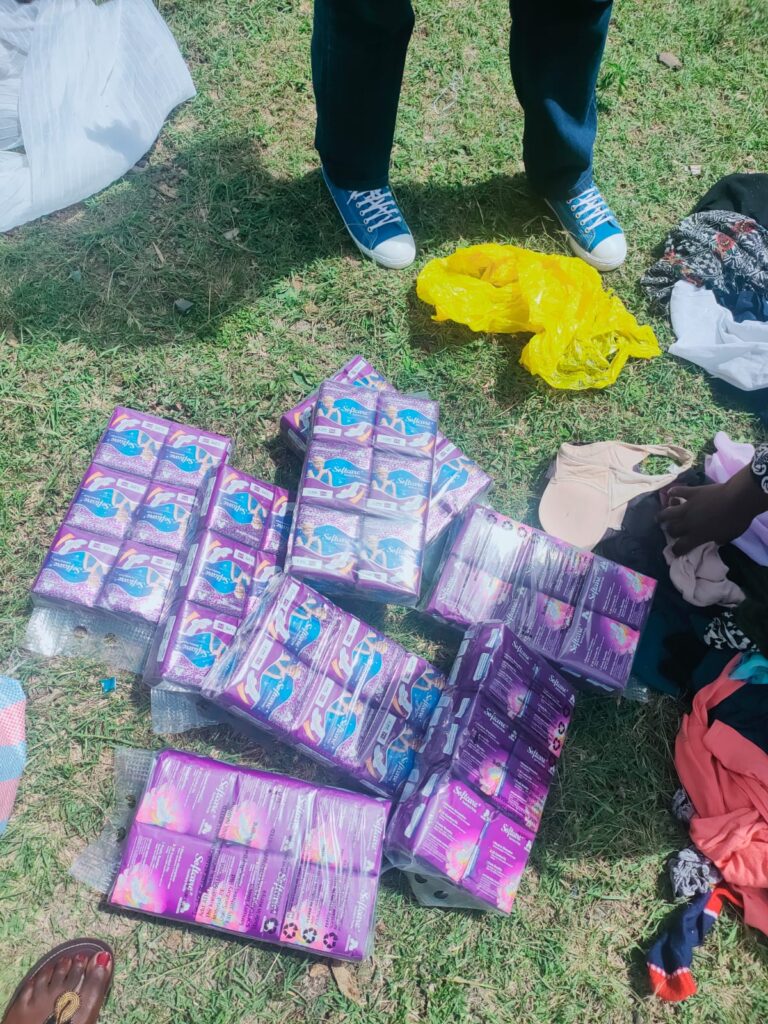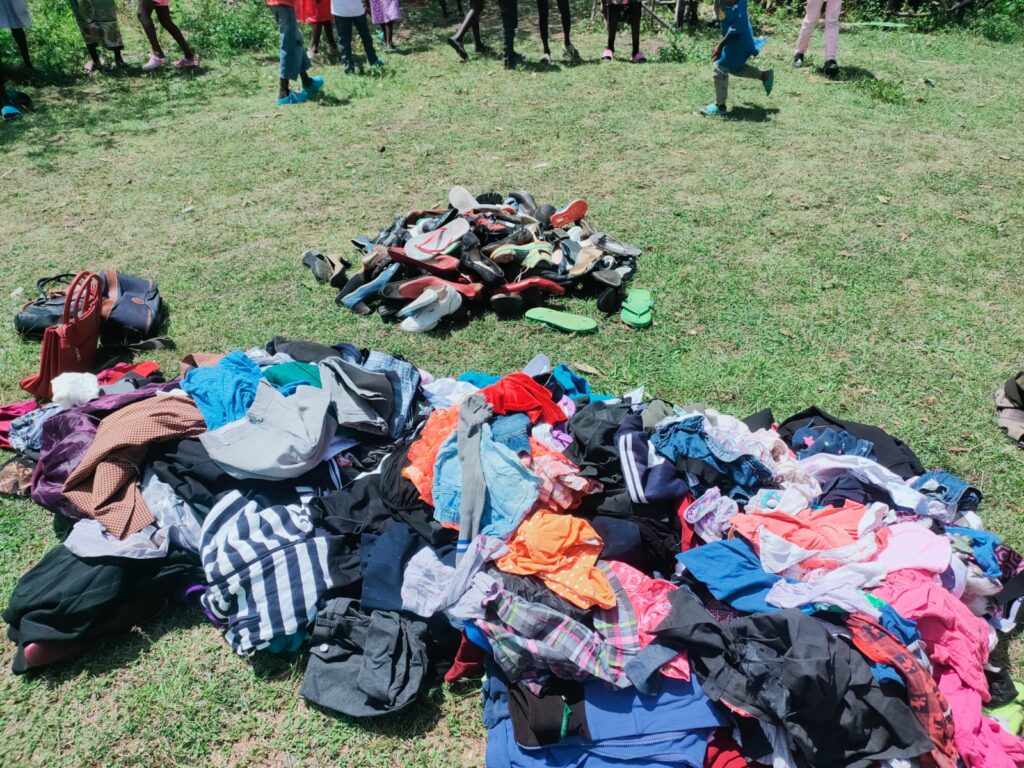0x052c6a85
Author: admin
HARVESTING HOPE IN KAJIADO: HOW VONEK IS HELPING SCHOOLS CAPTURE THE RAIN AND SECURE THE FUTURE
Introduction
In Kajiado County, water is life — yet for many schools and communities, it remains one of
the scarcest resources.

During the long dry months, learners walk miles in search of water, classes are disrupted, and hygiene standards decline. But with a changing climate and shrinking natural sources, one solution is proving to be both simple and transformative: rainwater harvesting. That’s why VONEK has launched a new partnership initiative to support schools in Kajiado county to install rainwater harvesting systems — in collaboration with well-wishers, philanthropists, and local community champions.
THE CHALLENGE: THIRST IN THE CLASSROOM
Kajiado is among Kenya’s Arid and Semi-Arid Lands (ASAL) counties, receiving an average annual rainfall of 500–800 mm, mostly between March–May and October–December. Unfortunately, much of that rainwater is lost as surface runoff because of limited infrastructure for collection and storage. In rural schools across Kajiado, water scarcity affects both learning and well-being. Studies indicate that up to 60% of schools in ASAL counties lack reliable access to water, forcing learners to carry jerricans from home or miss school during droughts. Girls are particularly affected — without water for sanitation, absenteeism increases during menstruation, leading to longterm learning gaps. Water scarcity also impacts hygiene, nutrition, and concentration levels. When children are thirsty, tired, or anxious about water, learning becomes a struggle.
THE SOLUTION: CAPTURING RAIN, EMPOWERING SCHOOLS
VONEK’s new initiative is built on one powerful idea: “Every drop counts.” By capturing and storing rainwater from rooftops, schools can create a sustainable water source that supports learners year-round.
Each participating school receives:
- Water storage and purification training for teachers and pupils
- Awareness sessions on hygiene, sanitation, and environmental conservation
- Community engagement to ensure long-term maintenance

This approach turns schools into centers of water resilience, benefiting not just students but also surrounding households that rely on them during dry spells.
THE IMPACT: EDUCATION FLOWS WHERE WATER FLOWS
Water harvesting has a proven impact across multiple levels:
| Area of Impact | Result |
| Attendance & Retention | Reliable water reduces absenteeism — schools with water see up to 20% higher attendance, especially among girls. |
| Health & Hygiene | Clean water cuts down cases of diarrhoea and waterborne diseases, improving learners’ focus and well-being. |
| School Feeding & Gardens | Stored water supports school gardens, providing vegetables for feeding programs and nutrition lessons. |
| Community Resilience | Neighbouring families benefit from shared access, reducing household stress and strengthening local cooperation. |
As one headteacher in Kajiado put it:
“When the tank fills, our children smile. They wash, they drink, and they stay in class. That one tank has changed our entire school.”
WHY IT’S A WORTHY INVESTMENT
According to Kenya’s Ministry of Water and Sanitation, rainwater harvesting can meet up to
60% of school water needs in semi-arid zones if properly implemented. A 10,000-litre tank can sustain a school of 300–400 pupils for several weeks, reducing reliance on costly water trucking. Moreover, the systems are low-maintenance and community-friendly — once installed, they provide lasting benefits at minimal recurring cost. Every shilling invested yields exponential returns in health, attendance, and dignity.
VONEK’S CALL TO ACTION: PARTNER WITH US
VONEK believes that no child should skip school because of thirst. Through our Water for Education – Kajiado Initiative, we aim to equip at least 20 schools with complete rainwater harvesting systems by the end of next year. We are inviting:
- Philanthropists, foundations, and corporate CSR partners to sponsor tanks, gutters, and installation.
- Churches, alumni associations, and well-wishers to “adopt a school” for water resilience.
- Local artisans and youth groups to participate in building and maintaining these systems. Together, we can make every school in Kajiado a model of dignity, health, and sustainability.
“WHEN WE HARVEST RAIN, WE HARVEST HOPE.”
Clean water keeps children in class, keeps communities healthy, and keeps hope alive — one tank at a time. Join hands with VONEK today to help transform Kajiado’s schools through rainwater harvesting
TABLE BANKING SUCCESS STORIES IN KENYA
Introduction
“Small savings, big changes.”
Table banking—an innovative, groupbased microfinance model—has revolutionized how underserved communities access credit. This Kenyanborn concept enables groups to save collectively and issue loans from pooled funds, bypassing high-interest institutions and the need for collateral.
Empowering Rural Women

AMANI WOMEN GROUP
In Nyakinyua village, Nakuru County, the Amani Women Group (AWG)—initially 10 women and a few men—pool savings weekly for community loans. Group funding has enabled members to build homes, buy land, send children to school, and start businesses. Leadership training and external support from Action10 and HR&S helped them grow beyond simple savings to community-level impact.
- They invested in livestock, farming, land leasing,
and even housing development. - Loan interest revenue accumulated, fueling
further community projects and sustainability.
JOYWO MOVEMENT’S NATIONAL REACH
Founded in 2009 by the Joyful Women Organization under the Mama Movement, JOYWO now covers over 110,000 women across 6,000 groups in nearly all counties. With a revolving fund of about US$20 million, table banking has liberated many women from reliance on predatory lenders and enabled them to form businesses, buy land, and earn income. Stories include:
- Groups where every member acquired land through loans.
- Women launching cafés, rearing goats or dairy cows, and even operating secondhand clothing shops—all starting with modest group loans.
Empowering Rural Women
KEWOTA: TEACHERS BUILDING WEALTH
The Kenya Women Teachers Association (KEWOTA) deployed table banking groups across counties to support women teachers. With financial literacy education and pooled funds worth over KSh8 million, teachers have:
- Cleared CRB blacklists
- Accessed low-interest loans
- Diversified into side businesses, land farming, cattle-keeping, and beekeeping,
- Built steady cash flow beyond monthly salaries—with improved household stability and dignity.
TECH-DRIVEN EXPANSION: WHATSAPP & DIGITAL GROUPS

Digital solutions have made table banking more accessible and efficient. For instance, Alpha Charlie’s director Caroline Gikunda praises groups managed through WhatsApp, allowing members to secure halfamillion-shilling loans with minimal red tape and instant access—demonstrating trust, integrity, and streamlined loan disbursement.
Benefits at a Glance
| Impact | Details |
| No collateral required | Access to loans without formal bank security —unsecured but trust-based |
| Low interest rates | Typically between 1–10% depending on loan term—far below commercial bank rates (~15%) |
| Savings culture | Members build discipline, earn interest in the group, and increase their financial resilience |
| Community empowerment | Groups evolve into community-owned ventures: land acquisition, agriculture, rentals, and more |
| Health and education | Extra income improves access to healthcare, family planning, and school fees—especially for children of rural women |
Challenges & Best Practices
| Governance and succession: Some groups face default, mismanagement, or leadership gaps if key officers leave —strong constitutions and rotation plans are vital. | Infrastructure limitations: Rural groups may lack reliable internet or electricity, impacting digital tools— partnerships and offline strategies are crucial. |
Groups overcome these challenges by enlisting mentors, adopting transparent rules, and collaborating with NGOs or development agencies for training and infrastructure support.
Featured Testimony
” My life has changed. Now I can provide for my family… with the profits from my farm… I also made
the decision to have two children. My life is full. ” — Kipkoech, beneficiary of SE empowerment initiatives
CONCLUDING THOUGHTS
Table banking in Kenya exemplifies how collective trust, agreement, and discipline can unlock financial freedom and sustainable livelihoods. While it began as a grassroots financial innovation, it’s now elevating whole families and transforming communities—especially for women who were previously excluded from mainstream finance.
Inspiring Inclusion: Womens Day Initiative Noretet Primaty School

On the occasion of International Women’s Day, a meaningful initiative was undertaken at Noretet Primary School, a rural underprivileged school in Kajiado, aimed at empowering young girls and boys through education and health. The project involved the distribution of sanitary towels to girls, coupled with an engaging sports activity that rewarded students with game balls.
The initiative focused on addressing a critical aspect of menstrual hygiene among young girls in the school. Recognizing the challenges faced by girls in accessing sanitary products, the project aimed to contribute to their overall well-being and break the stigma surrounding menstruation.
A dedicated team coordinated the collection and distribution of sanitary towels to girls age 10 and above in the school. The team ensured that the products provided were of high quality and met the specific needs of the students. Informational sessions were also conducted to educate the students about the importance of menstrual hygiene, emphasizing the normalcy of the natural biological process.

The sanitary towel distribution had a profound impact on the girls, promoting a sense of dignity and comfort during their menstruation. It not only addressed a basic need but also contributed to improving attendance and participation among female students, reducing the likelihood of absenteeism due to menstrual-related challenges.
To promote gender equality and foster a sense of unity among students, a sports activity was organized as part of the Women’s Day celebration. The event featured various games and competitions, encouraging both girls and boys to participate actively. Notably, game balls were awarded to participants, emphasizing the importance of teamwork and collaboration.
Alongside the distribution of sanitary towels and the sports activity, educational sessions were conducted to instill values of gender equality, respect, and understanding. These sessions aimed to break stereotypes and empower students to challenge societal norms that hinder progress.
The success of the initiative was bolstered by the active involvement of the local community. Parents, teachers, and community leaders played a vital role in supporting and encouraging the students. This collaborative effort contributed to the sustainability of the project’s impact beyond the initial event.
The Women’s Day initiative at Noretet not only addressed immediate needs but also paved the way for long-term positive change. By combining health, education, and community involvement, the project exemplified a holistic approach to empowerment. As we reflect on the success of this initiative, it serves as a reminder of the transformative power of collective action in creating a brighter and more inclusive future for all.
VONEK extends our heartfelt gratitude to all the supporters who made the Women’s Day initiative at Noretet a resounding success. Your unwavering commitment and generosity have empowered young girls and boys, fostering positive change in their lives. Whether through contributions, time, or encouragement, your support has made a meaningful impact, breaking barriers and creating opportunities.
Together, we’ve demonstrated the strength of collective action in building a more inclusive and equitable future. Thank you for being champions of empowerment and for standing with us in making a difference in the lives of the students at Noretet Primary School.
Kenyans For Sondu Victims Clashes Charity Drive
The date was 4th November 2023 and the venue for the charity drive was Saka & Ngenge IDP Camps..

Well wishers, sponsors and members of the community showed up in droves to support the idp camp victims afflicted by the Sondu clashes.



We whole-heartedly appreciate everyone who showed up to make our charity drive successful and we thank you. Be blessed.
OBSERVANCE OF THE AFRICAN CHILD DAY AT NORETET PRIMARY SCHOOL
Objective of the Activity
The event was arranged to honor the Day of the African Child, while enhancing community understanding of child rights and the significance of comprehensive education. Additionally, it served as a platform to further the objectives of the current initiative titled “Moving Noretet from Survival to a Model School.”

Community Awareness and Engagement
The teams from VONEK, CSRT, and My Little Thing involved parents, students, and community elders in an engaging educational session. The discussion focused on:
The interpretation and importance of the Day of the African Child in the current context.
The entitlement of every child—particularly girls—to receive quality, safe, and dignified education. The shared responsibility of families, elders, and educational communities in enhancing learning outcomes and ensuring child protection.
Elders reiterated their dedication to protecting children and enhancing education, particularly for girls within a traditionally pastoralist community.
Contributions & Exhibitions
The donations made during the event are as follows:
25 desks: Officially handed over to the school in the presence of the entire school community.
200 Kgs of porridge flour and 40 Kgs of sugar: These items are intended to support the school feeding program. The additional 300 Kgs of porridge flour and 60 Kgs of sugar will be delivered in two weeks after the current stock is depleted.
1000 sanitary towels: Distributed to girls during mentorship sessions. The remaining stock is retained by teachers for future monthly distribution.
A neighboring school also benefited from this contribution.
Underwear (Panties and Boxers): Girls received panties, while boys were given boxers. Younger students in preschool and grades 1–3 received their packs following guided play activities.
Stationery Packs: These were donated by other partners to aid classroom learning for all students.
Food and Refreshments: Provided for all attendees, including learners, teachers, parents, elders, and guests.
Mentorship Breakout Sessions
Participants were divided into breakout groups based on age and gender:
Teenagers & Pre-teens: Engaged in open discussions regarding adolescence, identity, hygie ne, and values.
Girls’ Forums: Addressed topics such as menstrual health, confidence enhancement, and personal safety. Sanitary towels and panties were distributed during the session.
Boys’ Forums: Concentrated on themes of responsibility, hygiene, and respectful conduct. Boxers were provided to them during this session.
Early Learners: Participated in organized play and subsequently received suitable support items (panties and boxers).
Expressions of Gratitude from the Community
During the event, a Maasai elder and trustee of the school expressed a sincere message on behalf of the community:
“We, the elders and trustees of Noretet, wish to convey our profound gratitude to the team from VONEK, CSRT, My Little Thing, and all associated partners. You have instilled dignity, confidence, and happiness in our children. Today, we feel acknowledged. We extend special thanks to the Jeevanjee family for their remarkable generosity towards our school. We look forward to the day when we can welcome and meet them in person, to express our gratitude face to face.”
A representative of the school Board remarked:
“Since the commencement of our partnership with these organizations, we have observed significant transformation—not only in terms of infrastructure and resources, but also in the academic performance of our students, both in the classroom and in extracurricular pursuits. There is a renewed spirit in Noretet. May God bless you for accompanying us on this journey.”
Primary Results
Fortified partnerships between the community and schools
Increased awareness of children’s rights through the celebration of the Day of the African Child
Essential educational supplies (desks, stationery, sanitary towels, food) have been provided to meet urgent needs
Learners have been empowered through mentorship and health education tailored to their age
There is a noticeable growth in community appreciation and ownership.
Subsequent Actions
Ensure the second shipment of porridge flour and sugar is delivered within a fortnight.
Maintain mentorship and the distribution of sanitary towels with the assistance of teachers.
Initiate consistent monitoring of both academic and co-curricular performance metrics.
Persist in collaborating with the nearby school to facilitate peer learning and collective community education.
Organize a community follow-up forum to strengthen achievements and strategize for future initiatives.
Hello world!
Welcome to WordPress. This is your first post. Edit or delete it, then start writing!


